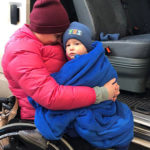I sometimes wonder, Who am I, God, that you have brought me this far? Lately, I’ve been whispering that question from 1 Chronicles 17:16: “Then King David [said], “Who am I, O LORD God, and what is my house, that you have brought me thus far?” Who am I to enjoy a platform on national radio for 40 years? Who am I that I should be so blessed in marriage to Ken for 40 years? And how did I ever have the strength to survive 55 years as a quadriplegic in a wheelchair?
The truth is, I don’t have the strength. I still wake up every morning needing God desperately. Like David, I often confess, “I am poor and needy” (Ps. 40:17). Perhaps that’s how God brought me this far. I cannot say, but I do know that “the eyes of the LORD range throughout the earth to strengthen those whose hearts are fully committed to him” (2 Chron. 16:9, NIV). God is searching high and low for weak people who love him so that he can pour into them his strength. Maybe that’s my story, but how I arrived here is not for me to say. I just keep praising my sovereign God with every milestone I pass.
It’s the noble cause of Christ to which I’ve dedicated myself for decades, and I can’t think of anything that gives me more joy. Yet as I reach the milestone of 55 years of quadriplegia—not to mention two bouts of cancer, severe breathing issues, COVID-19, and chronic pain—I hold tightly to Acts 20:24 (NIV): “I consider my life worth nothing to me; my only aim is to finish the race and complete the task the Lord Jesus has given me—the task of testifying to the good news of God’s grace.”
And with this anniversary marking 55 years in my wheelchair, I’m reflecting on more than a few milestones through which God has done amazing things.
God transformed my heart, changed my attitude, and showed me there are more important things in life than walking.
Anniversary of the Disabilities Act
When a broken neck upended my life 55 years ago, leaving me depressed and devastated, the last people I wanted to be around were wheelchair users like me. They made me feel awkward, so I basically ignored anyone with a disabling condition. Imagine my amazement when a little over a decade later, God used my own affliction to birth an international disability ministry. Somewhere within that decade, I rose above my fears of the future and my disdain for others with disabilities. God transformed my heart, changed my attitude, and showed me there are more important things in life than walking.
I landed in a wheelchair at a time when there was very little access for people using mobility equipment. Back in the 1970s I would arrive at a restaurant, only to be told to wheel down an alley, past smelly dumpsters, into a side door that led through a crowded, noisy kitchen in order to reach my dining table.
I remember getting stuck in a boutique dressing room while trying on clothes. My wheelchair had become wedged tightly between the swinging door and the wall; the store manager had to come and jerk me free. My wheelchair left scuff marks all over the dressing room. I was terribly embarrassed. That was the way things were in the early 70s, before the Americans with Disabilities Act (ADA).
With each passing year, I racked up more embarrassing incidents of being stranded, getting stuck, and navigating long, winding detours to get into movie theaters, restaurants, churches, and stores. I finally had my fill of embarrassing episodes, so I began to actively advocate for myself and for others with disabilities.
In the late 1980s, I somehow landed a position on the National Council on Disability under President Reagan. One of the first initiatives the Council tackled was the lack of access in public places. Working with other disability groups, we were able to send to Congress a landmark bill to improve access for Americans with disabilities. Finally, in 1990, I sat on the White House lawn with other Council members and watched President Bush sign into law the ADA.
I don’t often think about those days I served on the Council. During a recent vacation in Yosemite National Park, however, Ken and I noticed that everywhere we went, the paths were paved and marked with access symbols. I was pleasantly surprised to discover miles of trails I could wander. And for places I couldn’t wheel, there were accessible trams.
At one point while wheeling along the Yosemite Valley floor, I stopped to reflect tearfully on the days I would make my way through dark alleys and backdoors. That was then. And now? Virtually the whole national parks system is open to me. This month marks 32 years since the ADA was signed into law.
Beyond Advocacy: A Vision for Belonging
Of course, people living with disabilities need more than just smooth sidewalks, lowered drinking fountains, and exit ramps. Here in the U.S., laws enforcing accessibility standards are helpful, but they cannot deliver the sense of belonging that disabled people so often lack. Though 32 years have passed since the ADA, people with disabilities are often still isolated and marginalized. That’s why I started Joni and Friends in 1979. I knew there were countless thousands struggling with the same resentments and fears about their disabilities. So I pulled together a team of like-hearted friends who wanted to do everything we could to make Christ real to disabled people around the world.
A higher law than the ADA is needed. In Luke 14:13–14, Jesus tells us to “invite the poor, the crippled, the lame, the blind, and you will be blessed.” At Joni and Friends, we envision a world where every person with a disability finds hope, dignity, and their place in the body of Christ.
We envision a world where every person with a disability finds hope, dignity, and their place in the body of Christ.
For example, here in the U.S., we hold Family Retreats where parents of those with special needs receive much-needed respite and whole families discover they belong—not just within a community that understands them but in the body of Christ. Thousands of veterans have returned from war struggling with physical wounds, moral injuries, and PTSD, so we hold Warrior Getaways for these brave service men and women and their families. There are also desperate needs in communities like East St. Louis, Nashville, and Downtown Los Angeles. So we’re seeking to grow our programs and resource churches to bring people with disabilities into the fold—into God’s house through faith in Christ.
Global Reach for a Global Need
My heart breaks when I think of the 1 billion disabled people around the world, most of whom live in poverty with little hope of change. They feel forgotten by their communities. But Jesus hasn’t forgotten them.
In developing nations around the world, we’re distributing wheelchairs and Bibles through our Wheels for the World outreach. Joni’s House consists of disability centers offering occupational therapy, medical supplies, Bible studies and discipleship programs, job-skills training, wheelchair maintenance, and more. We also partner with local hospitals to provide wound care, surgical support, and physical therapy. In short, we labor to “prove” the power of the salvation message with evidence of Christ-centered compassion.
We were about to break ground on a new Joni’s House in Ukraine when the war erupted in February. As Russian bombs dropped, disabled people became stranded in harm’s way. So we started serving Ukrainians with disabilities—just not in the way we’d planned. Our in-country coordinator, Galyna, began organizing evacuation efforts, even as Russia stepped up its rocket strikes. Supported by her network of churches and our partners in Poland, Galyna worked tirelessly and courageously to track down people with disabilities and evacuate the most vulnerable among them—hundreds to date.
Now, even as Ukraine gets fewer headlines, Galyna and members of our network continue to provide housing and food supplies for Ukrainians with disabilities. We’re currently planning a Family Retreat for relocated Ukrainians with disabilities and their caregivers.
Heaven-Bent
From the dark basements in Ukraine to the foothills of the Himalayas to the streets of Downtown Los Angeles, people with disabilities are suffering unspeakably. Their needs are urgent, and so I’m “wheeling” the race that the Lord Jesus has set before me. There are too many people struggling as I did 55 years ago when I crushed my spinal cord and became a quadriplegic.
Aging with quadriplegia may be filled with extra challenges, but it doesn’t demoralize me. With God’s help, I hold everything lightly. I try not to grasp at my fragile life, nor coddle it or minimize my activities at Joni and Friends just because I’m getting older, growing weaker, and dealing with more pain. Rather, I find great comfort and joy in dying to self and living every day to serve the Lord Jesus and others around the world whose disabilities are far more profound than mine.
What else could be more important than practicing Christianity, with sleeves rolled up, among the needy? When I do become tired, I’m inspired by the life of Jesus who, even as he was nailed on his cross and in great pain, nevertheless kept serving others (like the thief, his mother, and the soldiers who needed forgiveness). Ephesians 5:1 tells me to imitate him. So I’m heaven-bent on honoring my Jesus, serving others, finishing the race, and completing the task of testifying to gospel grace.
Involved in Women’s Ministry? Add This to Your Discipleship Tool Kit.
 We need one another. Yet we don’t always know how to develop deep relationships to help us grow in the Christian life. Younger believers benefit from the guidance and wisdom of more mature saints as their faith deepens. But too often, potential mentors lack clarity and training on how to engage in discipling those they can influence.
We need one another. Yet we don’t always know how to develop deep relationships to help us grow in the Christian life. Younger believers benefit from the guidance and wisdom of more mature saints as their faith deepens. But too often, potential mentors lack clarity and training on how to engage in discipling those they can influence.
Whether you’re longing to find a spiritual mentor or hoping to serve as a guide for someone else, we have a FREE resource to encourage and equip you. In Growing Together: Taking Mentoring Beyond Small Talk and Prayer Requests, Melissa Kruger, TGC’s vice president of discipleship programming, offers encouraging lessons to guide conversations that promote spiritual growth in both the mentee and mentor.

































